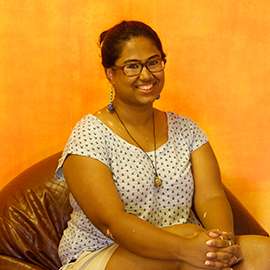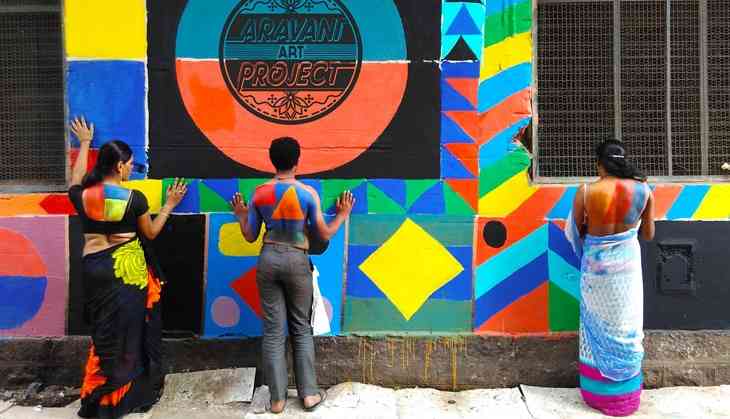
If you've encountered a wall with a beautiful mural of a transwoman signed Aravani Art Project, it's due to the efforts of this motley crew.
Poornima Sukumar and her friends work with transwomen in different cities around India to paint grand portraits on walls – portraits often featuring the very transwomen they're working with.
One year and three months later, the project has just finished work on a wall in Chennai. Catch spoke to Sukumar shortly after. In this interview, she told us about how they got started, what walls they pick, and living with the trans community.
Durga Sengupta (DS): This isn't your first project working with the trans community? There was a documentary...
Poornima Sukumar (PS): Well the documentary was with a London-based filmmaker. It went on for three and a half years. When it began I didn't know I was going to be working with the trans as a community. I just signed up as an assistant director, she needed somebody who knew India well – well enough to take them around, smart enough to talk to people.
When I met her I got to know about it and I was really excited, because there was no other way I would've met the community before in person. I didn't have prejudices before either, nobody told me you shouldn't talk to them. I had read about them a little, but I didn't know about their lives, and how the community exists. All I knew is that they haven't been accepted.
I think it takes time to understand them, for sure, but once you do, it's really intriguing. Not because they're different, but because how similar they are to us.
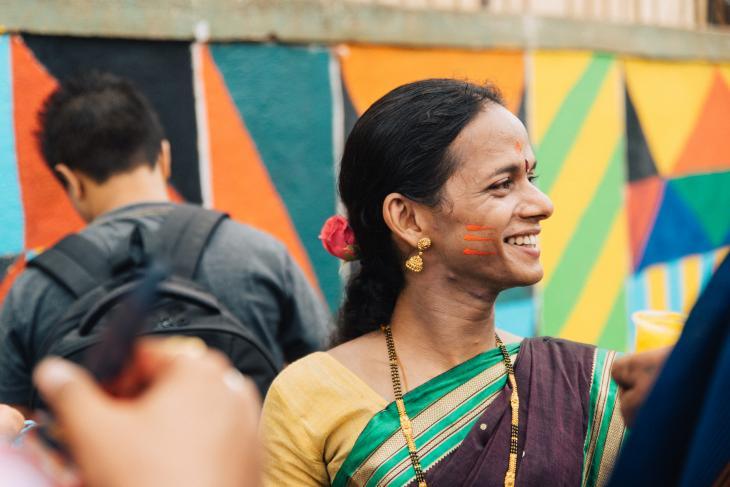
DS: What made you start the Aravani Art Project?
PS: By the end of the documentary, I think I was so spellbound [with the notion] that so many people didn't know about this community. It's so beautiful. And I'd been so privileged to see them, be with them, learn about them.
I wanted to see how I could involve my own circle of friends who don't know anything about them, just the way I was. Most of my guy friends were transphobic, they would laugh at them...
All my friends are in the creative field, and I thought [this could work]. I mean getting a group of trans people and my friends to talk [didn't make sense]. I didn't want to approach this like an NGO, like we were 'helping' them. I didn't want an approach where it felt like we were enabling them, helping them.
I just wanted them to just come and be themselves, and chill. Because they never get to do that, not outside their own community.
So, for a very selfish motive the project started. But as much as it was selfish, it couldn't have happened without all my friends, who came and supported, all the artists who came, and they were all up for painting a wall, with a new community.
DS: How do you get people to join you?
PS: I don't work with a particular group always, as I need to explore communities all over India. What we do is get to know the communities, live with them. We try and recognise the ones who can travel with us, or paint with us, or those who have some sort of leaning towards art.And most of them do. Some of them come, of course, because they're part of the community and like to join in. You get the vibe that they don't want anything more to do with it, they want to continue with their regular lives. And we completely respect that because as artists we can't change everybody's life, but we can recognise those who want to be part of the art circuit. We're still trying to figure out how to help them.
And most of them do. Some of them come, of course, because they're part of the community and like to join in. You get the vibe that they don't want anything more to do with it, they want to continue with their regular lives. And we completely respect that because as artists we can't change everybody's life, but we can recognise those who want to be part of the art circuit. We're still trying to figure out how to help them.
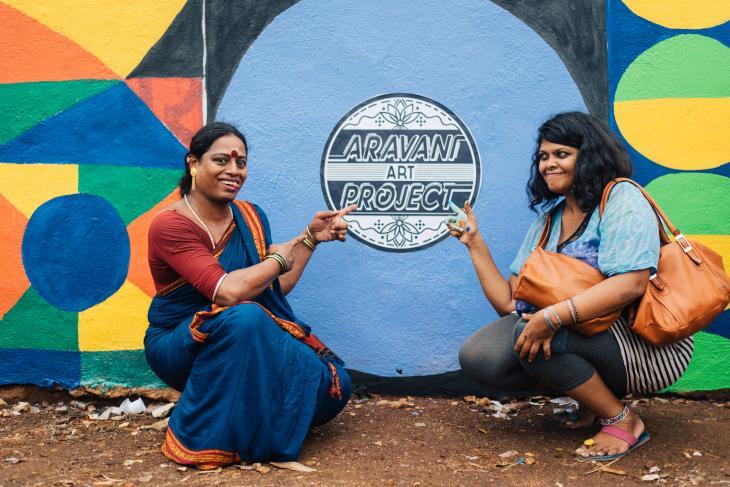
DS: Could you give me an idea of how many trans people have worked in this project so far?
PS: Well this was our eighth project that got done yesterday [in Chennai]. About 60 people so far [across Bangalore, Bombay, Chennai, Jaipur and Sri Lanka].
DS: Sri Lanka?
PS: Yeah, we just wanted to touch base. We were there for another project and when that got over we realised we were there for a few extra days and we could meet the community. Somebody was generous enough to offer a wall.
It was really nice. I'm trying to fly one of them down to do a project in Bangalore.
You know, I don't know if I would be able to change their lives. But in these small ways I'm trying to help them. I can't tell them to go for a 9-5 job, because I'm myself a freelancer.
Maybe they wouldn't like it either.
DS: Also, who are we to dictate what's right.
PS: Absolutely. I don't want them to ever feel that sex work is wrong. Of course we feel bad, but we respect [them]. We don't want to push it on them, or say that 'I wish you could do something else'.Instead we talk about how to improve health, go for regular checkups, [inform them] about precautions, emergency numbers... There are days you don't want to do it, and you should be free to accept that. There might be times they stand on the
Instead we talk about how to improve health, go for regular checkups, [inform them] about precautions, emergency numbers... There are days you don't want to do it, and you should be free to accept that. There might be times they stand on the streets not as sex workers, but just to catch an auto.
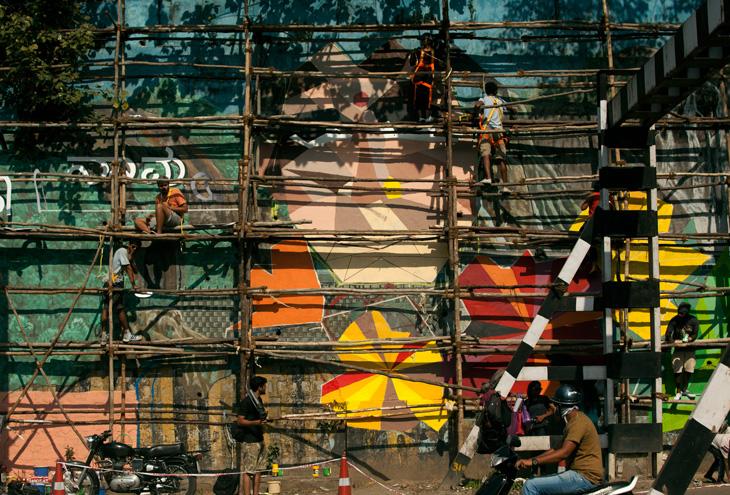
PS: So there are a lot of other conversations we try and have...
Shashi and Priya (*names changed), [are two transwomen] who've joined the team. Priya has been out of [sex work] for a while and she's working with a community radio in Bangalore. And she also felt the need to do a little more than work as a radio jockey, because she likes art.
Shashi, at the same time, is still doing sex work but we take her with us to every city we go to. She also told me, 'It's not about you finding me a job, and taking me out of this. This is something I want to do and it's my personal life.' So, [I've done small things] like I flew her back from Jaipur to Bangalore. This was her first flight ever, she never imagined she'd go to an airport.
DS: Painting walls. Is it also symbolic? Given the trans community's struggle for visibility?
PS: Yes, absolutely. Also, the fact that we paint their portraits on the walls... they feel very proud of it. They really celebrate it because they feel... [Sometimes they say] we're at par with the politicians. It's not just their faces that we need to see every day.
People don't anticipate a transwoman's portrait on a wall. So it's really interesting to see everybody's reactions. Until now it has been very positive, but then... it goes back to the fact that they can't even talk to them.
We want to start doing little workshops in colleges, because I think that's the only way to go about it.
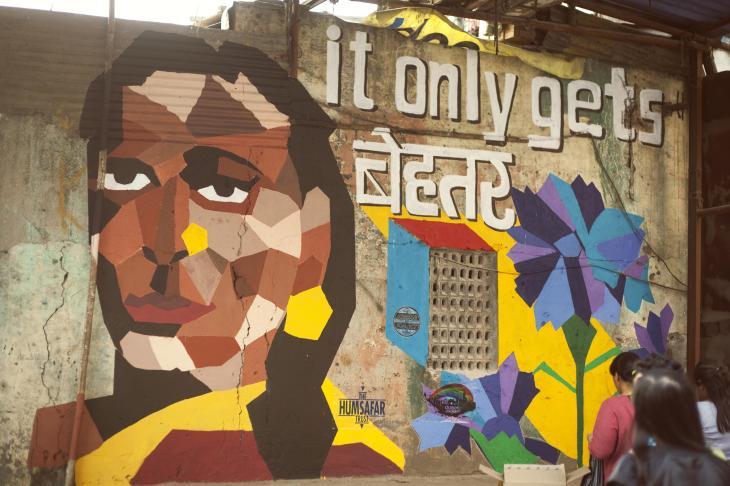
DS: So do you feature their portraits a certain way online?
PS: Social media is something I have no clue about. So suddenly having to do this is very challenging for me.
But there are these memories that keep popping up and I'll be like 'Oh she said such a beautiful thing and maybe I should post that'?
DS: Yeah, it can be a lot like Humans of New York. If you think about it.
PS: Yeah, but it's so tough. I mean, just yesterday I was with them. I don't know how to [share] this. It's too crazy, too beautiful. I was living in a building with about 40 transwomen and all my friends were with me as well, everybody stayed over for one or two days.
It was exactly how we'd watch TV with cousins during summer vacations. There will be a mommy who would cook for us and call us and feed us yummy hot food. And every one hour bring us chai...
How do you explain this to anybody? How do I even try and put it on social media?
[There are times when] none of us put anything up for a week, and we're just trying to understand what just happened. We have so much content, and we don't know how to go about it.
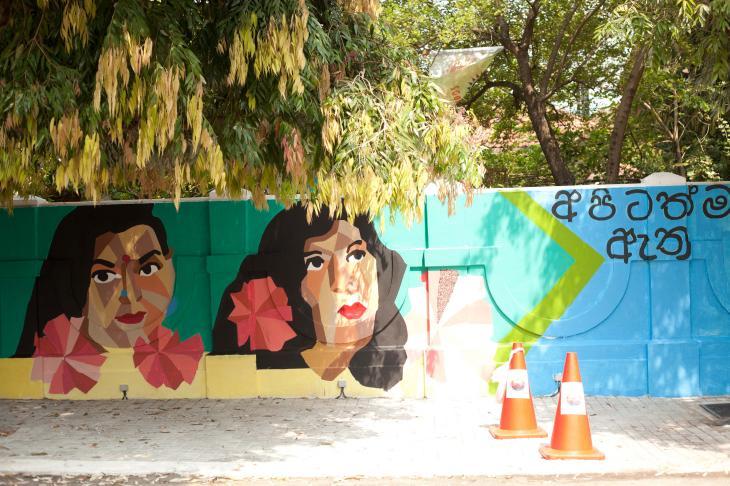
DS: So who gets to paint?
PS: Anyone. We have had autorickshaw-wallahs who've painted with us. Chaiwallahs who've painted with us, people who worked in the metro – when we painted at the Jaipur Metro Station all the ticketing people came down and painted with us. They came when it was not their shift to work, they came in earlier to paint.
So we've had all sorts of people joining us to paint. Wall painting allows for that to happen, and our designs are such that it only requires you to know that you need to stick to some lines.
Art is the medium of our approach, but it's only secondary to our approach. We want the conversations and bonding to happen [while we paint]. I'm constantly working on that, and my co-founder is working on the finishing of the wall.
DS: How do you pick a wall?
PS: We have two kinds of projects, always. One of course happens in the public sphere, like in the metro station, where everybody can come and see. And the other is [for] community building, like in Chennai, [in their own spaces].
And that's more of an exercise for us because we want to know the community [from a] closer [proximity] than just taking them out of their space and putting them in a public place. So we have a balance.
It depends on the opportunities we get and the kind of people who put us in touch with the community as well.
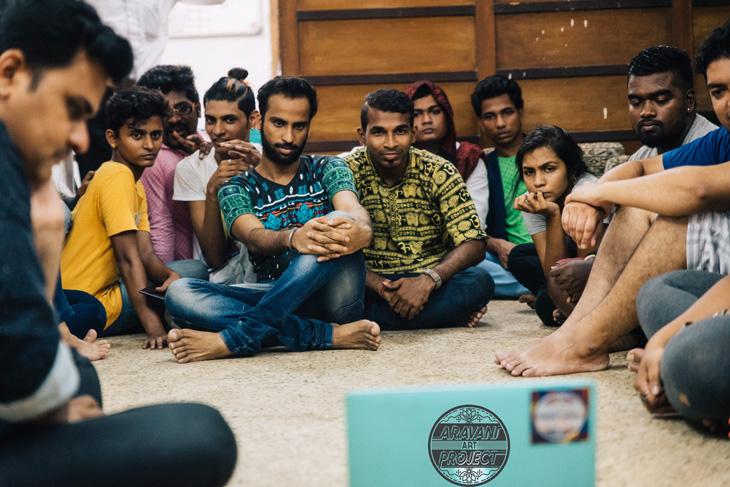
DS: Is there any anecdote you'd like to share from when a mural was being made?
PS: One of the transwomen was painting with us and it was really hot. I was feeling bad and I said, “I'm so sorry you had to come and paint in this scorching sun”. And she said, “Anything is better than standing under the streetlights in the night”.
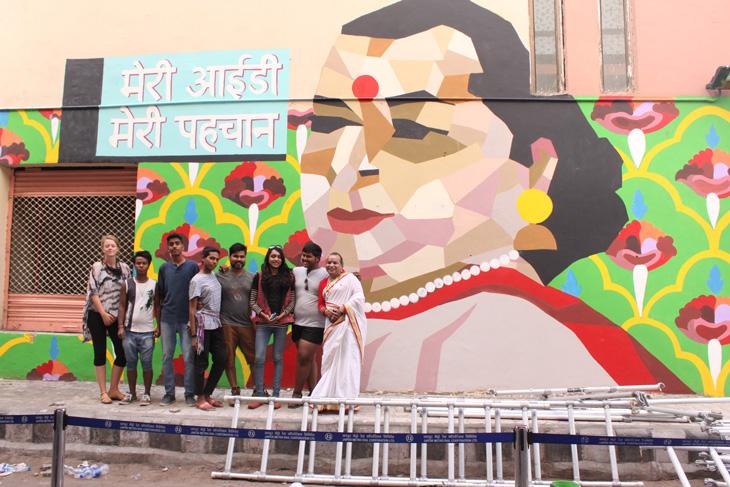
Since the project is a year old, they are looking out for art grants or CSR to be able to actually pay the transpersons who paint walls. Any kind of support is welcome. For more details mail them at aravaniartproject@gmail.com
First published: 3 April 2017, 0:10 IST

